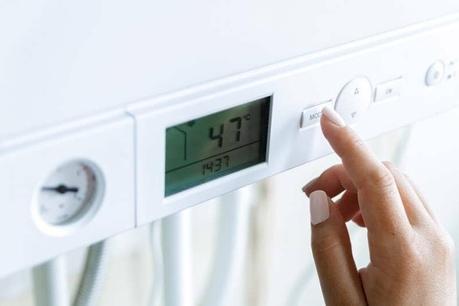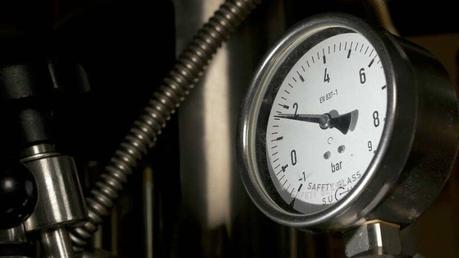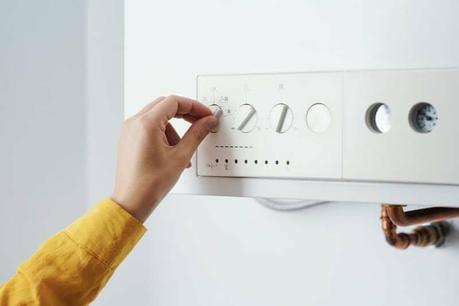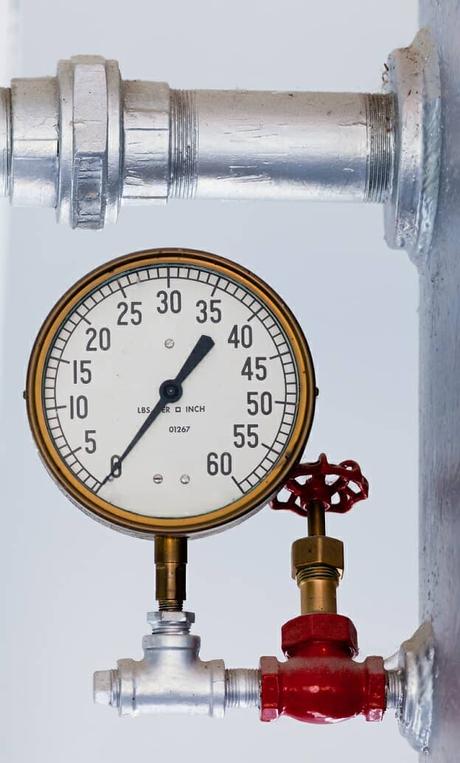What can cause low boiler pressure?
Leakages and boiler faults are a common cause of low boiler pressure, which can in turn lead to bigger problems with your central heating system if left unattended.
Such issues as a lack of hot water and being unable to adequately heat the home via your designer radiators and heated towel rails are real possibilities when boiler pressure gets too low.
So it is essential that homeowners understand when their boiler is losing water pressure, why it is happening and how to tackle the problem…

How to understand boiler pressure changes
The majority of boiler system components contain a level of water. However, modern central heating setups often don’t incorporate a water storage tank within the attic or loft, using an expansion vessel as an alternative.
As the volume of water fluctuates in line with differing temperatures, the expansion vessel will absorb pressure alterations in the water when contemporary boilers heat up the included water.
To ensure a safe and efficient working practice, boilers have to work within a specified gauge – in between 0.7 and 2.5 bar. If the pressure drops below this set range, a filling loop included on the central heating system can typically be called upon to top it up.
How can you tell if you have low boiler pressure?
If you are concerned that your boiler may be losing pressure and operating at a lower level than ideal, you should inspect its front panel. There, you will find a pressure gauge that will clearly display whether pressure levels are low, high or at an adequate point in between.
With modern central heating systems, it could be that a digital display screen shows an error message and an indication of what is causing the problem. If you have your boiler manual handy, you should be able to cross reference to see if the error code signifies low boiler pressure.
The boiler pressure gauge will show bars that point to the boiler pressure level. Should the pressure be shown below a single bar, it suggests your boiler has lost pressure. If the pressure indicator displays as high in accordance with the user manual, it tells you that your heating appliances are operating at a greater pressure than necessary. You can address the issue by bleeding your hot water radiators or heated towel rails connected to the central heating setup. Boilers incorporate an in-built safety mechanism that will activate to release pressure automatically before it reaches a hazardous level, but you should still look to bleed your devices if the pressure is showing as excessive.

Why do boilers lose pressure?
There are two main reasons that can typically cause a boiler to lose pressure…
Firstly, a leak on the connected appliance(s) or the boiler system, often from radiator valves or system components.
The other most common cause of a boiler losing pressure is from the release of air or water when a radiator is bled.
The network of radiators and pipes attached to the central heating system are susceptible to loosening and corrosion, enabling water to leave the boiler and lower boiler pressure over time with air the eventual substitute for water.

How to find a heating system leak
Whilst it is possible that leaks are identified within the walls of a radiator or pipework system, it is far more likely that they will be found at connection points. Search for signs of damp surrounding the radiators for an initial tell of a leak that could cause pressure loss. Pipes can become wet via condensation instead of a leak, so the best practice is to wipe the pipe down clean thoroughly and leave a bucket or bowl underneath to check for drip occurrences.
Another means to check for a leak is to inspect your pipework and nearby skirting boards for chipping, flaking or paint discolouring, plus water stains on the ceiling or the floor. Any of these indicate water damage resulting from leakage.
If you do notice these detrimental effects, it is imperative refrain from attempting piping repairs yourself, and instead turning to the services of a professional plumber to complete the job and address the issue of boiler pressure loss.
Can boilers lose pressure without leaking?
In the case that you have noticed no significant leaks, yet your boiler system is still working at a reduced pressure, it might be that the boiler itself is leaking, or there is a concealed chip on the system.
What causes a boiler to leak?
A boiler leak can happen when contained parts loosen or corrode over the course of time. Boilers should be serviced fairly regularly, but if you do slack on their maintenance, components can become loose and lead to pressure loss in the system, normally in the form of a drip from beneath the boiler.
Should you notice this drippage, or have any other reason to believe a boiler leak is causing the system to lose pressure, you should seek out the services of a Gas Safe Registered boiler engineer to take a look at the system and decide on an appropriate course of action. They will be able to recommend whether a particular boiler part needs repairing or replacing, and whether a simple solution could be to thoroughly clean the system out even. Be sure not to attempt to remove the outer shell of the boiler by yourself, and check the details of your warranty, as boiler repair or replacement can make for a costly overall job.
What causes faulty boiler parts?
Time simply marching on can be a factor in boiler parts becoming faulty and catalysing issues such as lower pressure levels. Again, you shouldn’t try to diagnose the malfunctioning boiler part yourself. Once again, a Gas Safe Registered engineer should be called upon to remove the boiler casing and work out which part is not working correctly. They can then advise whether the part is worth repairing or requires replacement.

How to fix low boiler pressure
Addressing the faulty boiler part or the source of the leak is undoubtedly the proper answer to how to fix low boiler pressure. However, it is possible to enhance boiler pressure with use of the attached filling loop. Usually, the filling loop is silver and features a flexible pipe connection with an isolation valve and handle valve at each end.
Take a flat head screwdriver, and adjust the isolation valve in an anti-clockwise direction until the valve line aligns with the relevant pipe. Then move the handle valve in the same direction to enable water to flow into the system. Keep an eye on the pressure gauge to make sure the pressure is rising to the appropriate level, then shut both valves by turning them back clockwise.
You will be able to tell if the boiler has returned to working at the right pressure levels based on the fault code or error message disappearing, or the proper heating of water and right boiler functionality.
If you aren’t confident in attempting to adjust boiler system pressure yourself, it is possible to use a Gas Safe Registered engineer, though they will surely charge for the favour. Before booking their assistance though, ask for help from family, friends or even neighbours. Chances are they have had experience in resetting their boiler pressure at some point, so it might save you a pretty penny to bend their ear.
Boiler pressure checklist
To summarise, you can tell if your boiler pressure needs addressing by following this simple and easy checklist…
- Inspect the pressure gauge and cross reference with your boiler manual to see if pressure is low.
- Look around radiator pipe connections for any signs of leaks, such as discoloured paint, water stains and markings on pipework and surrounding skirting boards.
- Contact a Gas Safe Registered engineer to proceed with a full-scale boiler inspection if you believe internal components are not working properly.
- Working out how to top up your central heating system pressure may help your boiler to remain in working order, so you have more time to allow and budget for the visit of a plumbing professional to check the system.
Contact BestHeating for home heating advice
You should have a good understanding at this point of the affecting factors at play in lowering boiler pressure, and the best ways to return your central heating system to work at an optimal level. But if you would like any further help, be sure to trawl our Advice Centre for all sorts of home heating tips.
Alternatively, you can get in touch with us to find out more. Leave your thoughts in the comments section below, or contact us via Instagram, Facebook or Twitter.
Got a radiator or heating question?

You can find a range of helpful answers to hundreds of common home heating questions on our FAQ pages.
Click the link or tap the image above to ask a question of your own!

